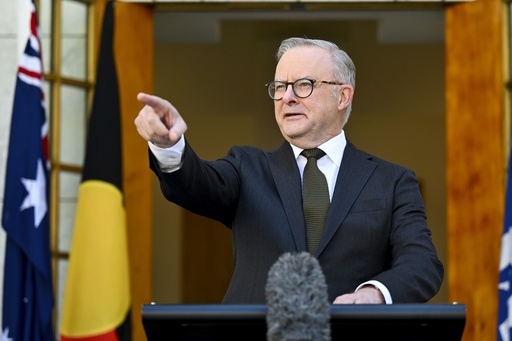
In a significant announcement made on Friday, Australia declared its commitment to bolster policing in the Solomon Islands by financing additional police forces and establishing a police training facility in Honiara, the capital of the South Pacific nation. This development comes amid the ongoing presence of Chinese law enforcement instructors operating there as part of a bilateral security agreement between the Solomon Islands and China.
Prime Minister Anthony Albanese revealed that the Australian government plans to allocate 190 million Australian dollars (approximately 118 million USD) over the next four years to support training and recruitment for the Royal Solomon Islands Police Force. Albanese indicated that this investment aims to minimize the need for external assistance in maintaining security.
“My government takes pride in making a substantial investment in the security infrastructure of the Solomon Islands, enabling them to uphold their primary responsibility for safety within their borders,” Albanese remarked to journalists in Canberra.
In a collaborative statement with Solomon Islands Prime Minister Jeremiah Manele, Albanese noted that this initiative would enhance the long-term security capabilities of the Solomon Islands while gradually decreasing the nation’s dependence on outside partners for support.
Australia has been actively pursuing security agreements with various Pacific island nations, especially following the controversial security pact between the Solomon Islands and China in 2022, which was established under the previous leadership of Manasseh Sogavare. This agreement has raised concerns among U.S. allies, including Australia, regarding the potential establishment of a Chinese naval base in the strategically critical region of the Solomon Islands.
During the time the pact was made, Albanese’s Labor Party characterized it as Australia’s most significant foreign policy misstep in the Pacific since the end of World War II. In recent months, Australia has also finalized security partnerships with Papua New Guinea, Tuvalu, and Nauru, which grant the Australian government effective veto power over any future security agreements these nations may wish to enter into with third parties, including China.
When questioned about whether the new agreement would necessitate the withdrawal of Chinese security personnel from the Solomon Islands, Albanese refrained from providing a direct response. He acknowledged the sovereignty of the Solomon Islands, stating they have their established measures, and indicated an expectation for those to persist in the future.
“As a result of this agreement, Australia aims to reinforce its position as the favored security ally in the region,” Albanese concluded.
Mihai Sora, an expert on Pacific islands from the Lowy Institute, a policy think tank based in Sydney, asserted that this agreement represents a considerable advantage for the Solomon Islands, granting essential support to its law and justice system. However, Sora highlighted that the Solomon Islands has yet to make any commitments to diminish the ongoing presence of approximately 14 Chinese police trainers in the country, who have been conducting an independent training program alongside the local police since 2022.
Sora remarked that this situation suggests the agreement does not establish a robust strategic alignment between the two nations, nor does it disrupt the existing security connection between China and the Solomon Islands.
Blake Johnson, an analyst at the Australian Security Policy Institute in Canberra, stated that Chinese law enforcement activities in the Pacific enable Beijing to exert influence over Chinese expatriates and advance other objectives. He expressed concerns about potential heavy-handed tactics and data privacy risks associated with the Chinese police presence in the region, citing instances where surveillance equipment has been provided, raising questions about its intended use and the data it may collect.
